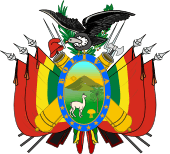Cabinet of Bolivia
Council of Ministers of Bolivia, or Cabinet of Bolivia, is part of the executive branch of the Bolivian government, consisting of the heads of the variable number of government ministries. The Council of Ministers are ministers of state and conduct the day-to-day business of public administration within Bolivia.[1] The President of Bolivia may freely reorganize the executive branch, with the most recent comprehensive reorganization occurring in February 2009.[2] Since then, the Ministry for the Legal Defense of the State has become the independent office of Solicitor General, and the Ministry of Communication has been created.
 |
|---|
| This article is part of a series on the politics and government of Bolivia |
|
Presidency
|
|
Legislative
|
|
Judiciary
|
|
|
|
|
Current Presidency
Cabinet of Bolivia Interim Presidency of Jeanine Áñez, 2019– | ||
|---|---|---|
| Office | Name | Term |
| Presidency | Jeanine Áñez | 13 November 2019 - present |
| Vice Presidency | Vacant | - |
| Ministry of the Presidency | Jerjes Justiniano Atalá | 13 November 2019 - 3 December 2019 |
| Yerko Núñez Negrette | 3 December 2019 - present | |
| Ministry of Foreign Affairs (Chancellor) | Karen Longaric Rodríguez | 13 November 2019 - present |
| Ministry of Government | Arturo Carlos Murillo Prijic | 13 November 2019 - present |
| Ministry of Defense | Luis Fernando López Julio | 13 November 2019 - present |
| Solicitor General's Office | José María Cabrera | 3 December 2019 - present |
| Ministry of Development Planning | Carlos Melchor Díaz Villavicencio | 15 November 2019 - present |
| Ministry of Education | Virginia Patty Torres | 18 November 2019 - 27 January 2020 |
| Víctor Hugo Cárdenas | 28 January 2020 - present | |
| Ministry of Rural Development and Land | Mauricio Samuel Ordoñez Castillo | 13 November 2019 - 27 January 2020 |
| Beatriz Eliane Capobianco Sandoval | 28 January 2020 - present | |
| Ministry of Economy and Finance | José Luis Parada Rivero | 13 November 2019 - present |
| Óscar Ortiz Antelo | 7 July 2020 - present | |
| Ministry of Public Works, Services, and Housing | Yerko Núñez Negrette | 13 November 2019 - 3 December 2019 |
| Iván Arias Durán | 3 December 2019 - present | |
| Ministry of Mining and Metallurgy | Carlos Fernando Huallpa Sunaga | 18 November 2019 - 7 May 2020 |
| Fernando Iván Vásquez Arnés | 8 May 2020 - 30 May 2020 | |
| Jorge Fernando Oropeza | 12 June 2020 - present | |
| Ministry of Justice and Institutional Transparency | Álvaro Eduardo Coimbra Cornejo | 13 November 2019 - present |
| Ministry of Health | Ánibal Cruz Senzano | 14 November 2019 - 7 April 2020 |
| Marcelo Navajas Salinas | 8 April 2020 - 20 May 2020 | |
| María Eidy Roca de Sangüeza | 21 May 2020 - present | |
| Ministry of Work, Employment, and Social Security | Oscar Bruno Mercado Céspedes | 28 January 2020 - present |
| Ministry of Hydrocarbons | Víctor Hugo Zamora | 14 November 2019 - present |
| Ministry of Energies | Rodrigo Álvaro Guzmán Collao | 13 November 2019 - present |
| Ministry of the Environment and Water | María Elva Pinckert Vaca | 13 November 2019 - present |
| Ministry of Productive Development and the Plural Economy | Wilfredo Rojo Parada | 14 November 2019 - 7 May 2020 |
| Óscar Ortiz Antelo | 8 May 2020 - 6 July 2020 | |
| José Abel Martínez | 7 July 2020 - present | |
| Ministry of Development Planning | Carlos Melchor Díaz Villavicencio | 15 November 2019 - present |
Merged ministries
On 5 June 2020, President Jeanine Áñez, through a message to the nation, announced the decision to reduce her Ministerial Cabinet from 20 to 17 State portfolios, with the aim of saving resources and investing them in strengthening the fight against the coronavirus pandemic .
Thus, the Ministry of Sports and Ministry of Cultures and Tourism were merged under the Ministry of Education, and Ministry of Communication was merged with the Ministry of the Presidency.[3]
Resources
References
- Country Studies: Bolivia
- Supreme Decree 29894, 7 February 2009.
- "Presidencia aclara que Culturas, Deportes y Comunicación seguirán como viceministerios". Correo del Sur (in Spanish). Retrieved 2020-07-09.